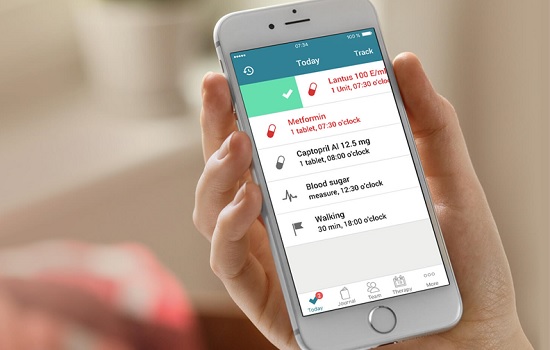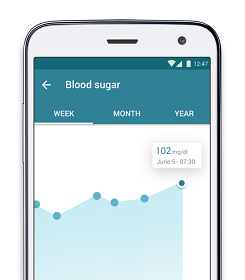When Sugar Isn’t so Sweet: Control Your Diabetes and Log Your Blood Sugar Levels with a Medication and Health Tracker App
Type 1 Diabetes Is a Chronic Condition That Needs to Be Managed with a Holistic Treatment Plan. Let Mytherapy Help You Manage Your Day-To-Day Treatment

On a basic level, if you are diabetic, it means your body is unable to control blood sugar levels and you will have an elevated level of blood sugar (glucose). There are two main types of diabetes, namely type 1 and type 2. This article will focus on diabetes type 1, which is also called insulin-dependent diabetes. It is a chronic condition and if it is left untreated, serious complications can arise, such as heart problems, stroke, kidney, and eye problems. By strictly monitoring your blood sugar levels, changing your lifestyle, and taking your prescribed medication, it is possible to prevent these complications and maintain normal blood sugar levels. However, managing your diabetes treatment is no easy task - that’s why it’s important to have a schedule in place to help you maintain your treatment. Smartphone health apps can help you with structuring your treatment plans and adhering to your medication and lifestyle changes.
MyTherapy, a medication reminder and health tracker app, was specifically developed with diabetes patients in mind. The app creates specific reminders that can help you measure your blood sugar levels (before and after meals) at set times throughout the day. The app can also be used for medication reminders, especially if you are taking statins, aspirin, or other drugs to reduce the risk of long-term complications. In addition to generating these reminders, MyTherapy also helps you monitor symptoms, diet, and exercise with its built-in digital health diary. You are also to able to record any important lab results. All the data that you record in the app can be generated into a monthly report, which comprises easy-to read graphs. You can then share this report with your doctor, who can assess how you are progressing with treatment.
Uploading your data is simple and you can choose how to upload your medication: via the app’s barcode scanner, choosing your medication from the app’s databases, or by manually entering your medication prescriptions. You can set your alarms to vibrate or silent if you so wish and you will be reminded by a pop-up notification too. You also have the choice to lock the app by either fingerprint scanner or passcode.
The team at smartpatient, the company behind MyTherapy, is dedicated to improving the app. We take our user feedback seriously and strive to tailor the app as much as possible to your individual needs. It is easy to use, has a user-friendly interface, and can therefore be used by any patient, of any age. MyTherapy was designed to help make living with diabetes less overwhelming by helping you routinize your treatment regime. Take control of your health and have some peace of mind with MyTherapy.
The Role of Insulin in Diabetes
Diabetes type 1 is a chronic condition caused by a shortage of the hormone insulin. Insulin is produced by the pancreas and controls the level of glucose (sugar) in your blood. Insulin is what is needed to allow sugar to enter cells to produce energy. This essentially makes insulin a type of “key” to open cells and without it, glucose doesn’t move into your cells and builds up in the blood. Your cells then starve and your blood sugar level rises. To compensate for this lack of glucose in the cells, the body begins to break down fat and muscle instead. This causes weight loss and a serious condition called diabetic ketoacidosis.
Diabetes type 1 is an autoimmune condition. This means that your immune systems mistakes the insulin-producing cells of your pancreas for foreign materials and therefore attacks them. It is not entirely clear why this autoimmune condition develops. As diabetes type 1 often runs in families, it may be linked to certain genes that are passed on from parents to children. Some researchers also suggest that it may be triggered by a viral infection. Diabetes type 1 usually starts in childhood, but it can occur at any age. Only 5% of those with diabetes have diabetes type 1. In America alone, about 1,25 million Americans have this condition. See here for more statistics.
The Symptoms of Diabetes Type 1 and Its Short-Term Complications
The symptoms of diabetes type 1 develop relatively quickly, usually within a number of days or weeks. The main symptoms include:
- Feeling very thirsty and hungry
- Tiredness
- Weight loss, particularly muscle loss
- Smell of acetone on the breath
- Blurred vision
- Itchiness
- Cuts and bruises that heal very slowly
- Urinating more often than usual
- Nausea and stomach pain
- Concentration disorders
- Irritability and mood changes
Having diabetes can also lead to various short-term complications. When your blood sugar level drops below a certain point (for instance by skipping a meal, exercising more than usual, or injecting too much insulin), you will get hypoglycemia. Signs of hypoglycemia include feeling shaky and weak, sweating, nausea, hunger, and confusion. This can lead to unconsciousness.
If the opposite occurs and your blood sugar becomes too high, you experience an episode of hyperglycemia. The symptoms of this are similar to the main symptoms of diabetes. However, their onset is more sudden and they are more extreme. Signs of hyperglycemia include extreme thirst, blurred vision, drowsiness, and an increased need to urinate.
If hyperglycemia is left untreated, a serious condition called diabetes ketoacidosis develops. This means that your body breaks down fat and muscle for energy, which leads to an increase of acids in your blood. Diabetes ketoacidosis causes vomiting, dehydration, unconsciousness, and, in some cases, can lead to death.
Over time, the complications of diabetes type 1 can begin affecting major organs in your body, including your heart, kidneys, nerves, and eyes. Without successful treatment, diabetes complications can be life-threatening.
If you experience any of the above-mentioned symptoms, it is crucial that you see your doctor immediately. If your doctor then suspects that you have diabetes type 1, he/she will do a physical examination and ask about your medical history. Your doctor will also perform various tests to diagnose the condition, such as a urine test or a blood test called the HbA1c test. These tests are used to measure the amount of glucose in your bloodstream and determine how your body is reacting to these levels. The HbA1c test indicates the average blood sugar levels over the past two to three months. It is often used for people, who have already been diagnosed with diabetes, to monitor their blood glucose levels over several weeks. If your blood sugar levels suggest diabetes, your doctor will carry out additional tests to determine what type of diabetes you have.
Types of Diabetes
There are different types of diabetes. Some of these include:
- Type 1 diabetes. The pancreas produces no insulin.
- LADA, which stands for Latent Autoimmune Diabetes of Adulthood. It is a form of type 1 diabetes that develops in adulthood. It is often mistaken for diabetes type 2, because it develops over a longer period of time than type 1 diabetes.
- Type 2 diabetes. The body doesn’t make enough insulin or it can’t use it properly.
- Gestational diabetes. Expectant mothers can’t produce and use all of the insulin needed for pregnancy.
Additionally, you can develop prediabetes, where your blood sugar level is higher than normal, but not high enough for a diagnosis of diabetes.
The first line of treatment involves insulin
Diabetes cannot be cured, but it is possible to control your blood sugar levels to reduce the symptoms and complications. Diabetes management is not easy and it involves several components, such as taking insulin and various medications, frequent blood sugar monitoring, eating a healthy and balanced diet, and exercising frequently.
Diabetes type 1 occurs because your body does not produce enough insulin. Therefore, to treat the condition, it is necessary to administer insulin yourself. There are various ways to introduce insulin into the body. The commonest methods include injections and insulin pumps. In addition to insulin, other medications may be prescribed to reduce the risk of long-term conditions like heart disease, stroke, and kidney disease. These drugs include statins (e.g. simvastatin) to reduce high cholesterol levels or anti-hypertensive medicines to control high blood pressure. Low-dosages of aspirin may also be prescribed to prevent stroke.
It is very important to monitor your blood sugar with type 1 diabetes several times a day, especially before meals, snacks, exercising, or driving. Moreover, it is important to know how your blood sugar levels are affected by carbohydrates. You should always strive to eat healthy foods and maintain a healthy weight.
Dealing with Diabetes with MyTherapy
Diabetes management involves many aspects, from insulin and drug adherence to diet and glucose monitoring. It can easily feel as though the condition is taking over your life, especially when the treatment regimen is so complex. For this reason, smartpatient developed MyTherapy. This app creates personalized reminders, so that injecting insulin or taking your medication is transformed from an everyday challenge into a simple to-do list. Moreover, the digital health diary can help you track your blood glucose, weight, blood pressure, and other health-related information over several months, weeks, or years. The health diary can also be used to track your diet and exercise. This makes it easier to see whether a treatment plan is working for you or if you need to change it. Because the app is developed through user feedback, it meets the needs and requirements of diabetes patients and is simple to use. Worry less - MyTherapy will take care of the rest.


